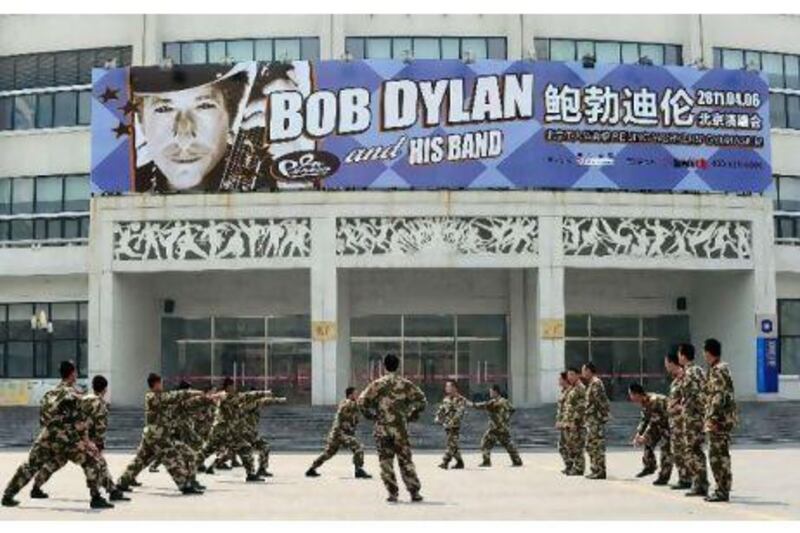BEIJING // Bob Dylan played his first ever concert in China last night, an event that coincided with a crackdown on dissent that has seen a prominent artist and dozens of other activists taken into custody.
After plans for performances in China were shelved last year, reportedly because Dylan would not allow the authorities to pre-approve which tracks he performed, the 69-year-old singer steered clear of controversy yesterday by leaving out some of his more celebrated protest songs.
There was no The Times They Are A-Changin' or Blowin' in the Wind in a set list this time signed off in advance by the Chinese authorities.
Whatever he played or sang in the Beijing Workers' Gymnasium last night, it was always unlikely Dylan was going to whip up a revolution. With tickets typically selling for about 680 yuan (Dh382), not far off what some poorly paid migrant workers in Beijing earn in a month, it was an event targeted at expatriates and China's emerging middle class.
As well as a dearth of protest songs - the only one was A Hard Rain's A-Gonna Fall - there was also an absence of banter from the artist, who spoke to the audience only near the end to introduce the band.
This week has seen growing international condemnation of the Chinese authorities over dozens of arrests following calls in February for "jasmine revolution" protests inspired by those that have swept the Middle East.
Among those seized is Ai Weiwei, an artist and activist whose detention on Sunday has been criticised by the United States and European Union.
Many big-name western bands and singers have performed in China, among them the Rolling Stones in 2006 and Michael Bolton last year, yet Dylan's arrival has still attracted heavy attention in local media.
Chinese concert-goers said the authorities had little to fear from Dylan, who will be performing in Shanghai on Friday and Hong Kong next week.
James Pang, 28, who works in promotions, said that while Dylan had made a huge contribution to music, "to the Chinese he's just a singer. It's just music," he said. "It's got nothing to do with politics."
Similarly, Li Xiang, 26, a medical publications editor, said Dylan was known for his anti-government songs, but they were "anti-US government, not anti-Chinese government".
"Most Chinese people are coming here not for the deep meaning of Bob Dylan," he said. "Most of the Chinese people they don't understand Bob Dylan. They don't understand what he was singing, they don't understand the underground knowledge of old-time America."
Dylan may have found it difficult to perform in China before because, although he "hasn't been a political singer since the late 1960s", the Chinese authorities probably still think he is one, said Barry Sautman, an associate professor at the Hong Kong University of Science and Technology whose research interests include Chinese politics.
Although the Communist Party is highly sensitive to the risk of social discontent developing, Dr Sautman said the dangers of having artists like Dylan perform in China were "very minimal".
There has been controversy in the past, notably in 2008 when the Icelandic singer Bjork shouted "Tibet, Tibet" at the end of her song Declare Independence at a Shanghai concert.
However, Dr Sautman said western artists have been performing for "quite some time" in China, with Wham! blazing a trail by putting on a show in 1985 at the venue where Dylan performed last night. Early on, concerns were less about politics and more concerned with "the nature of the performances".
"They made people dance in the aisles - that was perturbing to them in those days," Dr Sautman said.
Only a small percentage of western artists have a political agenda, he added, and most of these are "more involved in politics in their home countries or with world issues like hunger".
"There are some who have played at [concerts] for Tibet. They would still be looked into before they were allowed to perform and there would probably be some pledge extracted from them that they don't raise political issues," he said.






